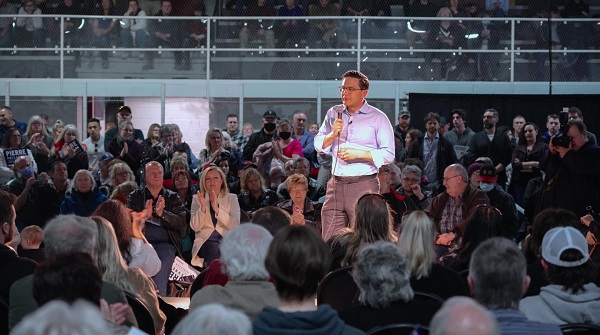Chinese interference, Poilievre: “What does the prime minister have to hide?”
TORONTO – The Liberal government’s inaction over (alleged) electoral meddling by China has some Canadian voters now wondering whether the results of the recent federal election can be trusted. That’s what Pierre Poilievre thinks: according to the leader of the Conservatives, Prime Minister Justin Trudeau has “inspired many suspicions” due to his refusal to answer detailed questions about China’s role in the 2019 and 2021 electoral campaigns.
Poilievre says the Chinese interference was known at the highest levels of government but was “kept under wraps” until “brave whistleblowers” leaked national security information that ended up in the press. Now, Trudeau has refused to call a public inquiry into the matter, which has made matters worse. “What does he have to hide?” asks Poilievre. “If we want to restore trust in our democracy, we need to answer these questions and bring transparency”.
Trudeau has so far avoided calling a public inquiry, announcing that his government will soon appoint a “special rapporteur” who will decide whether or not a commission of inquiry is needed to get to the bottom of the matter. The choice of speaker will be announced in the “next few days,” the prime minister said on Tuesday.
Meanwhile, Trudeau himself has asked the National Security and Intelligence Committee of Parliamentarians (NSICOP), a group of lawmakers and senators authorized to deal with security, to review what is known about Chinese interference. The House of Commons Affairs and Procedure Committee is also investigating the matter, to ascertain whether China has co-opted some Canadian candidates and illegally channeled money into local campaigns to support pro-Chinese MPs.
“We are – and have been for a long time – extremely concerned about China’s actions towards our businesses, our researchers, communities here in Canada and politics” Trudeau said. “This is a serious issue that we’ve always taken seriously, so we’re making sure Canadians continue to have confidence”.
But a Leger poll – which we covered in yesterday’s article – suggests that a sizable minority of Canadians don’t have much faith in the electoral system. About 29% of all respondents said Canada’s voting system is not secure, and the percentage is significantly higher among Conservative voters: 48%.
Trudeau nonetheless defended his government’s handling of election interference, recalling that he created the Critical Election Incident Public Protocol (CEIPP) group after the 2015 election – an independent group of bureaucrats who monitor “incidents” that threaten the integrity of an election – and brought together the Security and Intelligence Threats to Elections (SITE) Task Force to monitor threats.
But the government has also ignored legislation to implement a foreign registry: a bill that would have somehow harmed former Conservative MP Kenny Chiu, making him the target of Chinese interference in the 2021 vote. Indeed, Chiu flooded Chinese-language social media during the latest campaign: some of those messages accused Chiu of wanting to “suppress” the Chinese-Canadian community by supporting that bill. Chiu was then effectively defeated in the election, but conservative Senator Leo Housakos picked up the baton by introducing S-237, a bill that would establish a registry of foreign influence in Canada. Such a system would require agents working on behalf of a foreign government to record their interactions with public officials in Canada, otherwise they would face criminal penalties. “We have fallen far behind in accusing people who are trying to circumvent our democracy and our democratic institutions and it is about time the Trudeau government did something about it” Housakos told the CBC.




